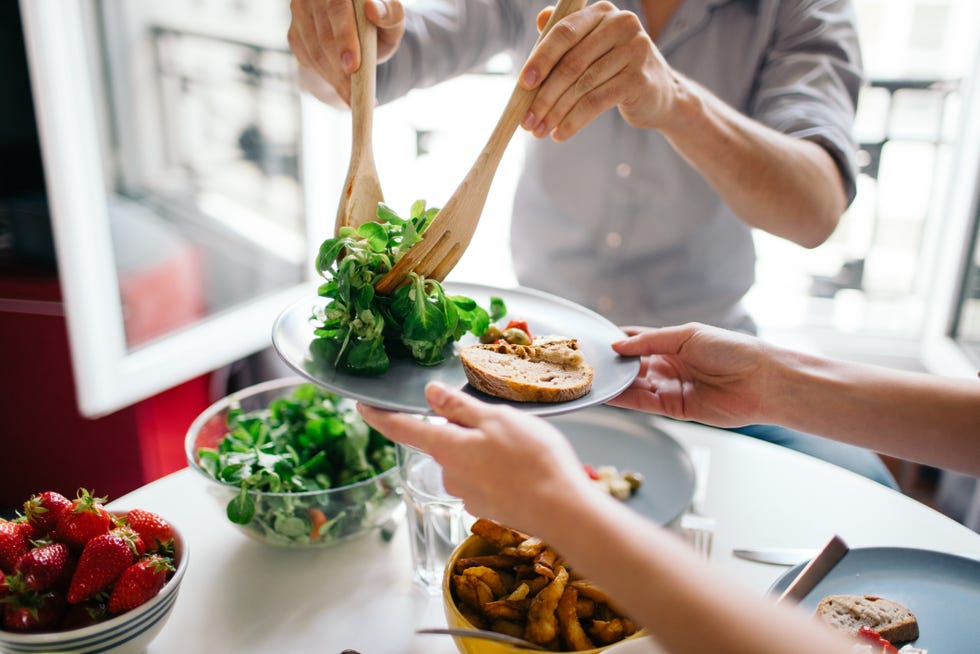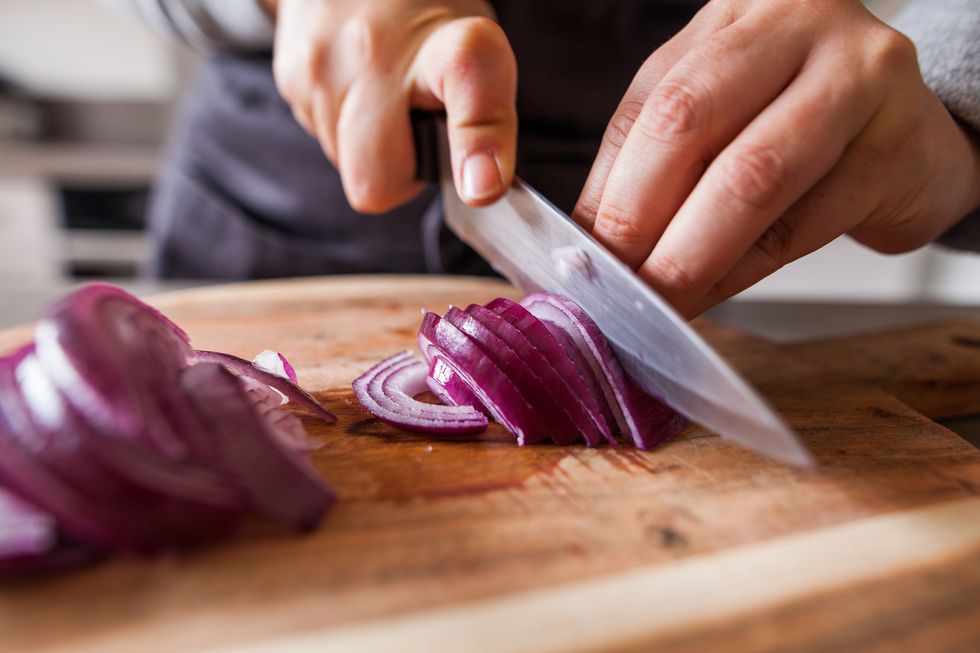QUERCETIN IS A NUTRIENT you probably haven’t heard that much about. But, it’s an essential one that offers a number of health benefits, including reducing your risk for heart disease, high cholesterol, and prostate cancer.
“Quercetin is a type of flavonoid, or plant pigment, found in antioxidant-rich foods like fruits and vegetables, as well as beverages like wine and tea,” says Anna Smith, R.D.N., L.D.N., a registered dietician for nutrition-tracking app Lose It.
So, it’s another reason to lean into a plant-based diet, or, at least, add a few more fruits and vegetables to your meals.
As a refresher, dietary guidelines say you need 1.5 to 2 cups of fruit and 3 to 4 cups of vegetables every day. But, only about 10 percent of American adults actually eat the recommended amount of fruits and vegetables, according to the Centers for Disease and Prevention.
Filling your diet with plants provides fiber (another thing most people don’t get enough of), as well as many other vitamins, minerals, antioxidants, and flavonoids, like quercetin.
Flavonoids are what give fruits and vegetables their colors. They have anti-inflammatory properties, and research shows flavonoids are directly linked to fighting cancer, promoting heart health, and boosting cognitive function.
If you eat a lot of produce, you probably get plenty of quercetin, and that’s the best way to consume it. But, if you dislike fruits and vegetables or don’t eat them regularly, supplements might be useful in some cases.
Here’s an overview of what quercetin is, its benefits, and how to add more to your diet, according to dieticians.
What Is Quercetin?
Quercetin is a flavonol, which is a type of flavonoid, that gives plants their vibrant colors. Caroline Cederquist, M.D., a family practice and functional medicine physician and co-founder and chief medical officer of meal delivery platform bistroMD, says it has “potent antioxidant properties.”
Flavonoids hunt for free radicals lurking in the body that can damage or destroy cells, according to the Icahn School of Medicine at Mount Sinai. Antioxidants help neutralize, reduce, or prevent free radicals from causing too much damage.
Quercetin is thought to be one of the most abundant flavonoids in your diet. It’s found in foods like onions, grapes, citrus, green tea, coffee, and red wine.
What Are the Benefits of Quercetin?
Quercetin has been linked to several health benefits, thanks to its antioxidant properties. These include:
Reducing Inflammation
“Quercetin may reduce inflammation in the body that’s linked to several chronic diseases,” like heart disease, cancer, and diabetes, Dr. Cederquist says. The reason is that antioxidants help fight the free radicals that cause inflammation.
Studies have shown that quercetin reduces inflammation markers in human cells in test tubes. A small study of women with rheumatoid arthritis found that taking quercetin helped reduce their stiffness and pain.
Minimizing Allergy Symptoms
Research suggests that in test tubes, quercetin can help stop immune cells from releasing histamine, the chemicals that cause allergic reactions. So it could possibly keep you from getting a runny nose or hives linked to allergies. But, according to Mount Sinai, there’s not enough evidence that it works in humans.
Lowering Heart Disease and High Blood Pressure Risks
Some research suggests that certain flavonoids, including quercetin, might lower your risk for plaque buildup in your arteries that could cause a heart attack or stroke.
Quercetin may also prevent damage caused by bad cholesterol, and people who eat flavonoid-rich diets tend to have lower cholesterol. And, taking quercetin supplements may lower blood pressure for individuals with hypertension.
Guarding Against Prostate (and Other) Cancers
Flavonoids have been shown to reduce your risk for certain types of cancer, by possibly keeping cancer cells and tumors from growing. A 2018 study showed that quercetin, specifically, prevented prostate cancer cells from surviving. Eating foods with quercetin also may lower your risk for lung cancer.
Quercetin is also often used to treat prostatitis, which is inflammation of the prostate, because it helps reduce symptoms of the condition.
Lessening the Impact of Covid-19, Potentially
Recent studies show that quercetin supplements given to patients with Covid-19 had the potential to reduce severe symptoms and increase recovery speed. But, researchers say more research on the relationship between quercetin and Covid-19 is needed.
Preventing Dementia
The antioxidant boost of quercetin may help protect you against dementia, Alzheimer’s disease, and other degenerative brain diseases. One animal study showed that when mice with Alzheimer’s were given quercetin injections over a three-month period, it reversed some of the disease’s markers and the mice performed better on learning tests.
The Best Foods Sources of Quercetin
Fruits and vegetables offer the best sources of quercetin, Dr. Cederquist says.
“The highest concentrations of quercetin are thought to be in vegetables—especially those in the onion family and leafy greens—and fruits with edible skin like apples and grapes,” she says.
Foods that contain quercetin include:
- Citrus fruits
- Apples
- Grapes
- Onions
- Parsley
- Sage
- Cherries
- Blueberries
- Blackberries
- Kale
- Broccoli
- Olive oil
- Tea
- Red wine
Always eat the whole food, when possible, and don’t ditch the peel to get the most quercetin and other nutrients, Smith says.
“As with most foods, the nutrient value can vary due to ripeness, growing conditions, or other factors, so eat a wide variety of sources to get your optimal dose of quercetin,” she says.
When Should You Take Quercetin Supplements?
As with any nutrient, food sources are always best. Supplements might be necessary sometimes, though.
“If you’re someone who doesn’t like fruits and vegetables or finds it difficult to eat them consistently, then you may be a good candidate for taking a quercetin supplement,” Smith says.
Quercetin might also help individuals manage conditions like high blood pressure or allergies, Dr. Cederquist says. But, it’s always best to talk to your doctor first.
Quercetin Side Effects
Quercetin is generally safe. Eating an abundance of flavonoid-rich foods is also encouraged. But, taking quercetin supplements at high doses or for long periods of time could pose problems for some people, Smith says.
“While some quercetin supplements contain large doses, it’s been safely used in doses as high as 1 gram per day for 12 weeks,” Dr. Cederquist says.
Before taking quercetin (or any supplement, really), talk to your doctor, especially if you’re taking medications or managing a chronic condition, like kidney disease, she adds.
“It’s always best to discuss supplementation with your medical provider to get a tailored recommendation based on your needs,” Smith says.
Erica Sweeney is a writer who mostly covers health, wellness and careers. She has written for The New York Times, HuffPost, Teen Vogue, Parade, Money, Business Insider and many more.





Comments are closed.